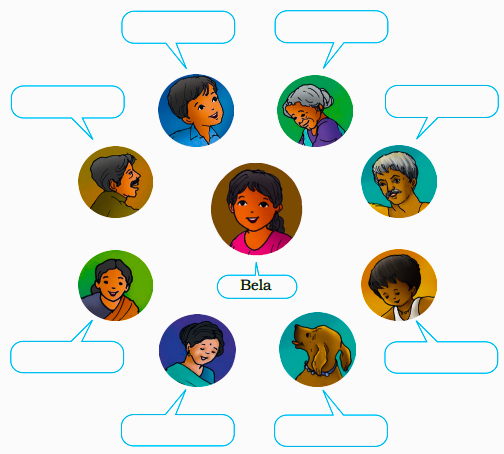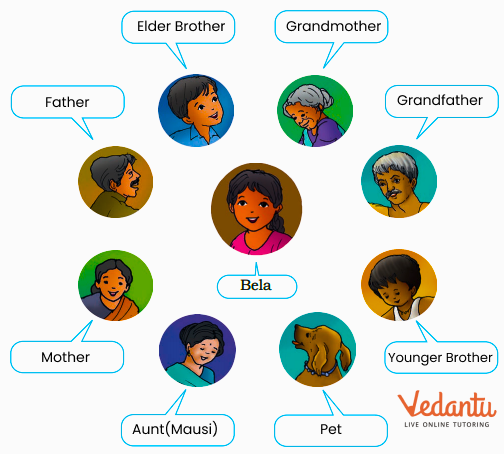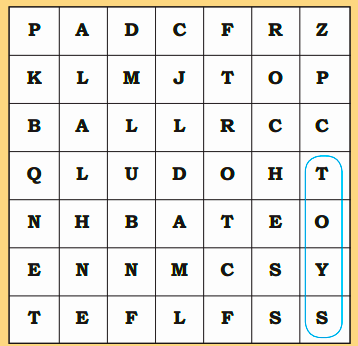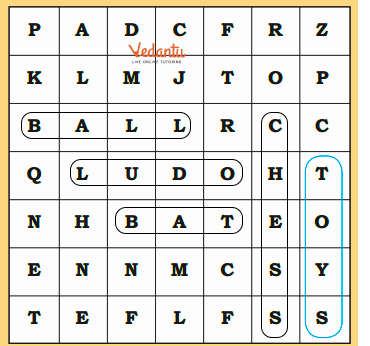Class 3 Evs Chapter 1 Questions and Answers - Free PDF Download
FAQs on NCERT Solutions For Class 3 EVS Chapter 1 Family and Friends (2025-26)
1. What are the correct NCERT Solutions for Class 3 EVS Chapter 1 Family and Friends as per the latest CBSE 2025–26 syllabus?
The NCERT Solutions for Class 3 EVS Chapter 1 Family and Friends provide step-by-step answers following the current CBSE guidelines. Solutions include clear explanations for all textbook exercises, such as describing family roles, importance of care among members, examples of helping at home, and activities to build social skills. Each answer is written in student-friendly language, ensuring easy understanding and exam readiness.
2. How should students write answers for Class 3 EVS Chapter 1 Family and Friends in CBSE-format exams?
To write correct answers for NCERT Solutions, students should follow these tips:
- Read each question carefully and identify the key point.
- Start answers with direct responses, using examples from family life.
- Include values like cooperation, respect, and sharing as highlighted in the chapter.
- Use simple sentences and avoid unnecessary information.
- Support answers with real-life cases or brief reasons when required.
3. Who are the members of Bela’s family according to NCERT Solutions for Class 3 EVS Chapter 1?
Bela's family members, as described in the NCERT textbook, are: her mother, father, grandmother (Dadiji), and two brothers—Banku Bhaiya and Bishu. Each member has a unique role and helps to make the home a happy and supportive place.
4. Why is it important not to hurt or tease animals as per the NCERT Solutions in Chapter 1 Family and Friends?
It is important not to hurt or tease animals because:
- Animals have feelings and can experience pain like humans.
- Treating animals kindly shows empathy and builds compassion.
- Being respectful to animals creates a safer and friendlier environment for all.
5. What activities from NCERT Solutions Class 3 EVS Chapter 1 help develop social skills?
Activities from Chapter 1 that develop social skills include:
- Playing cooperative games with family and friends.
- Helping elders with daily tasks.
- Sharing stories and songs about rain or family moments.
- Taking care of younger siblings or elderly members at home.
6. How do NCERT Solutions for Class 3 EVS Chapter 1 support moral value development?
NCERT Solutions promote moral values by emphasizing concepts such as kindness, responsibility, respect, and helping others. By explaining real-life scenarios in family relationships, these solutions teach students to apply such values within their homes and communities, as per CBSE 2025–26 requirements.
7. In the official CBSE exam, how should you explain 'sharing food with animals' from Class 3 EVS Chapter 1 NCERT Solutions?
In exams, students can answer by stating: Sharing food with animals, such as birds or stray dogs, shows compassion and helps creatures in need. For example, feeding grains to birds or biscuits to dogs demonstrates care and responsibility towards animals in the environment.
8. What is a common misconception students have about family and friends in Class 3 EVS, and how does the NCERT Solution clarify it?
A frequent misconception is that only family members are important, whereas the solution clarifies that friends and community members also play essential roles in our lives. NCERT Solutions highlight that social relationships beyond the family, like with friends, teachers, and neighbours, are equally important for support and learning.
9. According to NCERT Solutions, how should students complete family work tables in Chapter 1 Family and Friends?
Students should first observe daily activities at home, then fill the table by noting which family member performs each task, such as:
- Cooking food — Mother or Grandmother
- Watering plants — Father or Brother
- Mending things — Father or Grandmother, etc.
10. How do Class 3 EVS NCERT Solutions for Chapter 1 ensure exam readiness?
Solutions for Chapter 1 are written as per CBSE marking scheme, use easy and direct answers, and cover all textbook exercises. They also provide sample activities and value-based reasoning, preparing students for both direct and comprehension-based questions in the exam.
11. Why is helping elders at home highlighted in Class 3 EVS Chapter 1 NCERT Solutions?
Helping elders at home is emphasized because it teaches students about respect, responsibility, and family bonding. Such actions make the home more supportive and develop children's skills in empathy and cooperation, aligning with NCERT and CBSE learning goals.
12. What skills do students develop by studying NCERT Solutions for Class 3 EVS Chapter 1 Family and Friends?
By engaging with the solutions, students enhance:
- Social awareness
- Empathy and caring nature
- Communication skills
- Understanding of mutual respect and cooperation
13. How are exam-based application questions addressed in NCERT Solutions for EVS Class 3 Chapter 1?
The solutions address application-based questions by encouraging students to relate concepts to real situations, such as describing how they help at home or how they show care for others, and explaining the reasons behind family roles. This approach matches CBSE's focus on competency-based education.
14. What are the main themes of Class 3 EVS Chapter 1 as per NCERT Solutions?
Main themes include:
- Understanding different family structures
- Roles and responsibilities within a family
- The significance of friends and the community
- Development of moral values such as care, respect, and cooperation
15. How do NCERT Solutions for Class 3 EVS Chapter 1 Family and Friends build foundational life skills?
These solutions build foundational life skills by teaching students about sharing, helping, teamwork, and respecting diversity in families and friend groups. They encourage students to apply these lessons in daily life, preparing them for real-world social interactions.





























